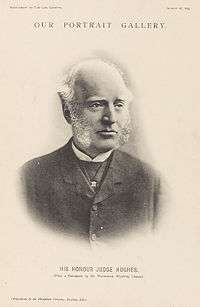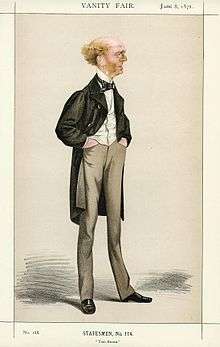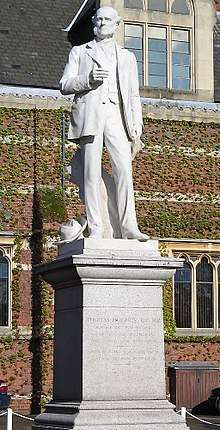Thomas Hughes
Thomas Hughes QC (20 October 1822 – 22 March 1896) was an English lawyer, judge, politician and author. He is most famous for his novel Tom Brown's School Days (1857), a semi-autobiographical work set at Rugby School, which Hughes had attended. It had a lesser-known sequel, Tom Brown at Oxford (1861).
Thomas Hughes | |
|---|---|
 Thomas Hughes in The Law Gazette, c. 1893 | |
| Born | 20 October 1822 Uffington, Berkshire (now Oxfordshire), England |
| Died | 22 March 1896 (aged 73) Brighton, East Sussex, England |
| Pen name | Vacuus Viator[1] |
| Occupation | Lawyer, writer, reformer |
| Nationality | English |
| Period | Nineteenth century |
| Genre | Children's literature |
Hughes had numerous other interests, in particular as a Member of Parliament, in the British co-operative movement, and in a settlement in Tennessee, USA, reflecting his values.
Early life
Hughes was the second son of John Hughes, editor of the Boscobel Tracts (1830) and was born in Uffington, Berkshire (now Oxfordshire). He had six brothers, and one sister, Jane Senior who later became Britain's first female civil servant. At the age of eight he was sent to Twyford School, a preparatory public school near Winchester, where he remained until the age of eleven. In February 1834 he went to Rugby School, which was then under the celebrated Thomas Arnold, a contemporary of his father at Oriel College, Oxford.
Hughes excelled at sports rather than in scholarship, and his school career culminated in a cricket match at Lord's Cricket Ground.[2] In 1842 he went on to Oriel College, and graduated B.A. in 1845. At Oxford, he played cricket for the university team in the annual University Match against Cambridge University, also at Lord's, and a match that is still now regarded as first-class cricket.[3]
Legal career
Hughes was called to the bar in 1848, became Queen's Counsel in 1869 and a bencher in 1870. He was appointed to a county court judgeship in the Chester district in July 1882.[4]
Social interests
A committed social reformer, Hughes became involved in the Christian socialism movement led by Frederick Maurice, which he joined in 1848. In January 1854 he was one of the founders of the Working Men's College in Great Ormond Street, and was the College's principal from 1872 to 1883.[5]
Hughes gave evidence in 1850 to a House of Commons committee on savings.[4] In so doing he participated in a Christian Socialist initiative, which led shortly to the Industrial and Provident Societies Partnership Act 1852, and the emergence of the industrial and provident society.[6] The Act was the work of Robert Aglionby Slaney, with whom Hughes worked in alliance.[7][8]
Hughes was involved also in the formation of some early trade unions, and helped finance the printing of Liberal publications; and acted as the first President of the Co-operative Congress in 1869, serving on the Co-operative Central Board.[9] He invested with William Romaine Callender in co-operative mills, in 1866.[10]
In politics

Hughes was elected to Parliament as a Liberal for Lambeth (1865–68), and for Frome (1868–74). He stood as candidate in 1874 for Marylebone in 1874, but dropped out just before the election, despite support from Octavia Hill.[4][11] The context for the end of his political career was the unpopularity with Hughes's Frome constituents of his support for the Elementary Education Act 1870.[12]
As an MP Hughes worked on trade union legislation, but was not in a position to have major changes passed.[4] He had greater success in improving the legal position of co-operatives, which in particular became able to operate as a limited company.[8] The issue of legal obstacles to the operation of labour unions was topical, and in 1867 Hughes was made a member of a Royal Commission set up to consider the matter. Initially he was the only one on the committee sympathetic to the union point of view; after some lobbying he was joined by Frederic Harrison, and a concession was made to union representatives, allowing them observer places in the proceedings.[13] Hughes then worked with Harrison and Robert Applegarth to diminish the effect of some of the testimony from employers.[14]
The outcome of this Commission was that Harrison, Hughes and Lord Lichfield produced a minority report (1869), recommending that all the legal restrictions should be dropped.[13] Then the matter was raised again in a second Commission, at the end of Hughes's time in Parliament. At that point Alexander Macdonald used a minority report to refer back to Hughes's earlier view; but Hughes signed the majority report. It advocated amendment of the Master and Servant Act 1867, but little substantive change to the Criminal Law Amendment Act 1871 and the law of conspiracy.[15]
Later life
In 1878–9 Hughes began writing The Manual for Co-operators (1881), with Vansittart Neale, for the Co-operative Congress. As a side-product he developed an interest in the model village.[16] In 1880, he acquired the ownership of Franklin W. Smith's Plateau City and founded a settlement in America—Rugby, Tennessee—which was designed as an experiment in utopian living for the younger sons of the English gentry. It followed closely on the failed colony Buckthorn (existing about 1872 to 1879), established by another Englishman Charles Lempriere, in western Virginia; this settlement had supposedly been suggested by Hughes.[17] Rugby was also unsuccessful on its own terms, but it still exists and is listed on the U.S. National Register of Historic Places.
Hughes was also a prominent figure in the anti-opium movement, and a member of the Society for the Suppression of the Opium Trade.[18]
At the end of the 1880s Hughes clashed with John Thomas Whitehead Mitchell of the Co-operative Wholesale Society, over the vertical integration Mitchell favoured for the Society.[19] Hughes died in 1896 aged 73, at Brighton, of heart failure, and was buried there.
Works
While living at Wimbledon, Hughes wrote his famous story Tom Brown's School Days, which was published in April 1857. He is associated with the novelists of the "muscular school", a loose classification but centred on the fiction of the Crimean War period.[20] Although Hughes had never been a member of the sixth form at Rugby, his impressions of the headmaster Thomas Arnold were reverent.

Hughes also wrote The Scouring of the White Horse (1859), Tom Brown at Oxford (1861), Religio Laici (1868), Life of Alfred the Great (1869) and the Memoir of a Brother. His brother, George Hughes, was the model for the Tom Brown character.
Family
In 1847, Hughes married Frances Ford, daughter of Rev. James Ford, and niece of Richard Ford, and they settled in 1853 at Wimbledon.[4] Their house there was built by the North London Working Builders' Association, a Christian Socialist co-operative; and was shared with J. M. F. Ludlow and his family;[21] Ludlow already shared barristers' chambers with Hughes, and the arrangement lasted four years.[4] There were five sons (Maurice, James, George, John, and Arthur) and four daughters (Lilian, Evie, Caroline and Mary) of the marriage.[22][23]
Lilian Hughes perished in the sinking of the RMS Titanic in 1912. The youngest child Mary Hughes was a well known Poor Law guardian and volunteer visitor to the local Poor Law infirmary and children's home.
Legacy
A Hughes Scholarship was founded at Oriel College, Oxford. It was a closed award, open only to members, or sons of members, of some co-operative organisations.[24] The first scholar was elected to Oriel in 1884.[25] It was later combined with an award honouring Vansittart Neale.[26]
A statue of Hughes (pictured) stands outside Rugby School Library: the sculptor was Thomas Brock, and the statue was unveiled in 1899.[27]
Bibliography
Fiction
- Tom Brown's School Days (1857)
- The Scouring of The White Horse (1859)
- Tom Brown at Oxford (1861)
Non-fiction
- Religio Laici (1861)
- A Layman's Faith (1868)
- Alfred the Great (1870). In the Sunday Library for Household Reading, this was a largely political work, and was history verging on fiction.[28]
- Memoir of a Brother (1873)
- The Old Church; What Shall We Do With It? (1878)
- The Manliness of Christ (1879)
- True Manliness (1880)
- Rugby Tennessee (1881)
- Memoir of Daniel Macmillan (1882)
- G.T.T. Gone to Texas (1884)
- Notes for Boys (1885)
- Life and Times of Peter Cooper (1886)
- James Fraser Second Bishop of Manchester (1887)
- David Livingstone (1889)
- Vacation Rambles (1895)
- Early Memories for the Children (1899)
References
- Joseph F. Clarke (1977). Pseudonyms. BCA. p. 164.
- "Scorecard: Marylebone Cricket Club v Rugby School". www.cricketarchive.com. 18 June 1840. Retrieved 11 March 2013.
- "Scorecard: Oxford University v Cambridge University". www.cricketarchive.com. 9 June 1842. Retrieved 11 March 2013.
- Lee, Sidney, ed. (1901). . Dictionary of National Biography (1st supplement). 3. London: Smith, Elder & Co.
- J. F. C. Harrison ,A History of the Working Men's College (1854–1954), Routledge Kegan Paul, 1954
- Arnold Bonner (1970). British Co-operation. Cooperative Union. p. 66.
- Matthew, H. C. G. "Slaney, Robert Aglionby". Oxford Dictionary of National Biography (online ed.). Oxford University Press. doi:10.1093/ref:odnb/25713. (Subscription or UK public library membership required.)
- Mitchell, Charlotte. "Hughes, Thomas". Oxford Dictionary of National Biography (online ed.). Oxford University Press. doi:10.1093/ref:odnb/14091. (Subscription or UK public library membership required.)
- Congress Presidents 1869–2002 (PDF), February 2002, archived from the original (PDF) on 28 May 2008, retrieved 18 October 2007
- Howe, A. C. "Callender, William Romaine". Oxford Dictionary of National Biography (online ed.). Oxford University Press. doi:10.1093/ref:odnb/39657. (Subscription or UK public library membership required.)
- Octavia Hill (23 December 2010). Life of Octavia Hill: As Told in Her Letters. Cambridge University Press. p. 262. ISBN 978-1-108-02457-0.
- Paul Smith (1967). Disraelian Conservatism and Social Reform. Routledge & Kegan Paul. p. 178 note 3.
- Paul Smith (1967). Disraelian Conservatism and Social Reform. Routledge & Kegan Paul. p. 46.
- Saville, John. "Applegarth". Oxford Dictionary of National Biography (online ed.). Oxford University Press. doi:10.1093/ref:odnb/37120. (Subscription or UK public library membership required.)
- Paul Smith (1967). Disraelian Conservatism and Social Reform. Routledge & Kegan Paul. p. 215.
- Edward R. Norman (3 October 2002). The Victorian Christian Socialists. Cambridge University Press. p. 91. ISBN 978-0-521-53051-4.
- Lee, Sidney, ed. (1912). . Dictionary of National Biography (2nd supplement). 2. London: Smith, Elder & Co.
- Kathleen L. Lodwick (1996). Crusaders Against Opium: Protestant Missionaries in China, 1874-1917. University Press of Kentucky. pp. 55–66. ISBN 978-0-8131-1924-3. Retrieved 23 May 2012.
- Arnold Bonner (1970). British Co-operation. Cooperative Union. pp. 134–5.
- John Sutherland (1990). The Stanford Companion to Victorian Fiction. Stanford University Press. p. 453. ISBN 978-0-8047-1842-4.
- Norman Vance (1985). The Sinews of the Spirit: The Ideal of Christian Manliness in Victorian Literature and Religious Thought. Cambridge University Press. pp. 138–9. ISBN 978-0-521-30387-3.
- Oldfield, Sybil. "Hughes, Mary". Oxford Dictionary of National Biography (online ed.). Oxford University Press. doi:10.1093/ref:odnb/38525. (Subscription or UK public library membership required.)
- "gb1499-thl - Thomas and Mary Hughes Letters - Archives Hub". Retrieved 14 June 2014.
- Oxford University Handbook (1912), p. 31; archive.org.
- Charles Lancelot Shadwell, Registrum Orielense, an account of the members of Oriel College, Oxford vol. 2, (1893), pp. x–xi; archive.org.
- Arnold Bonner (1970). British Co-operation. Cooperative Union. p. 499.
- Public sculpture of Warwickshire, Coventry and Solihull by George Thomas Noszlopy, page 28–29
- Donald Scragg; Carole Weinberg; Simon Keynes; Andy Orchard (2 November 2006). Literary Appropriations of the Anglo-Saxons from the Thirteenth to the Twentieth Century. Cambridge University Press. pp. 16–7. ISBN 978-0-521-03117-2.
- This entry incorporates some public-domain text originally from the 1911 Encyclopædia Britannica but has been heavily edited.
- The Aftermath with Autobiography of the Author (John Bedford Leno published by Reeves & Turner, London, 1892)
Further reading
- Kidd, Bruce (2006). "Muscular Christianity and Value-centred Sport: the Legacy of Tom Brown in Canada". International Journal of the History of Sport. 23 (5): 701–713. doi:10.1080/09523360600673096.
External links
| Wikimedia Commons has media related to Thomas Hughes. |
| Wikiquote has quotations related to: Thomas Hughes |
| Wikisource has original works written by or about: Thomas Hughes |
- Works by Thomas Hughes at Project Gutenberg
- Works by or about Thomas Hughes at Internet Archive
- Works by Thomas Hughes at LibriVox (public domain audiobooks)

- Hansard 1803–2005: contributions in Parliament by Thomas Hughes
- Historic Rugby, Tennessee
- Thomas Hughes correspondence collection is held at The National Co-operative Archive, Manchester.
- Details of Hughes family
| Parliament of the United Kingdom | ||
|---|---|---|
| Preceded by Frederick Doulton James Lawrence |
Member of Parliament for Lambeth 1865 – 1868 With: Frederick Doulton |
Succeeded by William McArthur James Lawrence |
| Preceded by Sir Henry Rawlinson, Bt. |
Member of Parliament for Frome 1868 – 1874 |
Succeeded by Henry Lopes |